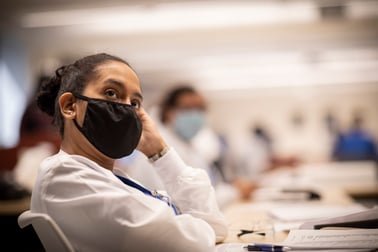The Labouré College of Healthcare campus is mask friendly, meaning face masks are optional in the classroom and around campus.
As of May 11, 2023, the Centers for Disease Control (CDC) has decided to move forward with ending the COVID-19 public health emergency.
During the public health emergency, Labouré College of Healthcare advised students, faculty and staff to consult with the Wellness Coordinator in the Wellness Center if they became sick and tested positive for COVID-19.
Now that the public health emergency has ended, the College no longer requires the guidance of the Wellness Center and the Wellness Coordinator.
Beginning in Fall 2023, if you become sick and test positive for COVID-19, you should stay home and report it to your instructors and/or supervisor to determine how long you will be out. Any student who tests positive for COVID-19 should complete the COVID-19 Positive Case Form online, quarantine, and communicate their status with their instructors.
The COVID-19 Positive Case Form is for internal contact tracing purposes and data collection. A staff member will follow up with students who test positive for COVID to offer additional support. The College will not disclose any information to others and will only report aggregate data.
According to the CDC, “Students should engage in proper health maintenance activities so as to function safely and effectively in the class, lab, clinical, or professional practice experience. The CDC advises students to stay home if they are sick.” These recommendations pertain to all faculty and staff personnel as well.
All students, faculty, and staff should continue to stay up to date with required vaccines, respect each other, and prevent those around you from becoming ill.
MPox Information
According to the WHO, the mpox virus is transmitted through close contact with another infected person, contaminated materials, or an infected animal. With respect to person-to-person spread, the virus can spread face-to-face, skin-to-skin, mouth-to-mouth, or mouth-to-skin, though possible transmission through the air is not yet well understood.
Mpox Symptoms
Symptoms of mpox infection include some or all of the following:
- A rash that can look like pimples or blisters
- Fever
- Headache
- Muscle aches
- Backache
- Swollen lymph nodes
- Chills
- Exhaustion
The incubation period (which is the interval from infection to onset of symptoms) for mpox can last up to 21 days. If a person tests positive for mpox, the illness can generally last between two and four weeks.
A person with mpox can spread it to others from the time symptoms start until the rash has fully healed and a fresh layer of skin has formed.
CDC will continue to monitor the latest information about how mpox spreads.
Monkeypox Exposure and Diagnosis
- If a faculty, staff, or student has Mpox, they should not come to campus and should report it to your instructors and/or supervisor to determine how long you will be out (this may include isolating at home until your symptoms have dissipated).
- If a faculty, staff, or student has had close contact with someone who has been diagnosed with Mpox or exposed to an environment contaminated with the virus, they should monitor themselves closely for mpox symptoms for the 21-day incubation period.
COVID-19 Resources
For information and resources about COVID-19 from state and federal resources, please use the links below.
